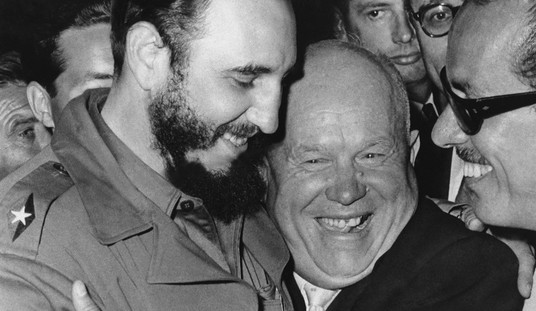About three hours ago, the AP finally joined the Washington Post and some other national news organizations in reporting the “troubling portrait” of Nidal Malik Hasan, the man believed responsible for 13 deaths and dozens of wounded at the world’s largest army base. In hearing these details, many people wonder why the Army had ordered Hasan into a war zone — and perhaps why Hasan remained in the military at all:
For six years before reporting for duty at Fort Hood, Texas, in July, the 39-year-old Army major worked at the Walter Reed Army Medical Center pursuing his career in psychiatry, as an intern, a resident and, last year, a fellow in disaster and preventive psychiatry. He received his medical degree from the military’s Uniformed Services University of the Health Sciences in Bethesda, Md., in 2001.
While an intern at Walter Reed, Hasan had some “difficulties” that required counseling and extra supervision, said Dr. Thomas Grieger, who was the training director at the time. …
At least six months ago, Hasan came to the attention of law enforcement officials because of Internet postings about suicide bombings and other threats, including posts that equated suicide bombers to soldiers who throw themselves on a grenade to save the lives of their comrades.
They had not determined for certain whether Hasan is the author of the posting, and a formal investigation had not been opened before the shooting, said law enforcement officials who spoke on condition of anonymity because they are not authorized to discuss the case. …
On a form filled out by those seeking spouses through a program at the mosque, Hasan listed his birthplace as Arlington, Va., but his nationality as Palestinian, Khan said.
“I don’t know why he listed Palestinian,” Khan said, “He was not born in Palestine.”
USA Today has even more this morning:
U.S. Rep. Michael McCaul, a Republican from Austin, was briefed by military officials and said Hasan had taken some unusual classes for someone studying about mental health.
“He took a lot of extra classes in weapons training, which seems a little odd for a psychiatrist,” McCaul said.
McCaul said Hasan had received poor grades for his work at Walter Reed and was not happy about his situation in Fort Hood, where Hasan apparently felt like “he didn’t fit in.”
“He’s disgruntled because he had a poor performance evaluation, he doesn’t believe in the mission, he’s looking at getting transferred to Afghanistan or Iraq,” McCaul said. “He’s not happy about all that.”
McCaul added that officials planned to interview Hasan to try to determine for sure that he was not working with foreign agents.
“From an intelligence standpoint, that’s key, finding out if he talked to anyone overseas,” McCaul said.
With all of these red flags, why was Hasan still in position to get deployed into a war zone? Why hadn’t the Army taken action to isolate Hasan, or remove him entirely? A Hot Air reader who served as a medical officer at Fort Hood earlier in this decade explains that the military has a great reluctance to act against his former colleagues, and that promotion of marginal medical officers is not unusual at all:
It is true that the promotion for medical and dental officers in the Army is extraordinarily easy. Just as long as you don’t kill anyone, fraternize with enlisted or come out of the closet, and get decent Officer Evaluation Reports, you’ll easily make Lieutenant Colonel in 20 years. With a little more work and additional schooling, you could make full Colonel. But basically you can set your clock to getting promoted every 7 years. So he may have had one bad report, but probably did barely enough to get him through the promotion board. But we don’t know what “bad” means…he may have simply failed the physical fitness tests, or he may have no clinical skills at all.
The Army has a unique way of handling providers who pose an obvious threat to soldiers they are supposed to care for. We had one dental officer who practiced dentistry far below the standard of care. He was moved first to doing examinations only (the most benign job) and eventually moved to an administrative job. The Army unfortunately can’t fire anyone, they just take them out of the equation or move them around to where they can’t hurt anyone. Being released from the military is a different story. Hasan’s obligation to the military depends on how much ROTC time, medical school time and residency time added up to. So if the Army paid for his education, he is obligated to serve, and there’s almost no way out of that. He could pay the Army back that money and get out of the contract, but that’s a long, long paper trail. There’s always the conscientious objector route, but if he was sincere, and not the loon he is appearing to be, his chain of command (superior officers) might have exempted him from deployment. However, he is a medical officer and NOT a combat soldier, so that argument just about flies out the window, since his role is medical support, and not combat. I’ve heard a lot of ways out of deployment (ie Ehren Watada, Tina Mahuika) and each case is unique. Ultimately the final decision can be influenced by the chain of command’s perception of the officer.
So not only would the Army be highly reluctant to discharge him, Hasan probably had few options for leaving the service, assuming that the Army paid for his medical education. That explains his rank, and his predicament in getting shipped out to Iraq and/or Afghanistan. As a medical officer and not (necessarily) a combat officer, the conscientious objector route would not have applied anyway.
We’ll keep up with this story during the day as more developments occur.
Update: I agree with Rick Moran to some extent that casting this as an example of a pending wave of Islamic jihad in the US is just a wee bit premature, as well as a pending wave of fraggings over US war policy, etc etc etc. Hasan appears to be a lunatic whose motivations — at least as far as we know at this point — are entirely his own delusions. We shouldn’t be afraid to report the facts, but we should be wary about drawing wide-reaching conclusions from them until we have a lot more certainty.








Join the conversation as a VIP Member